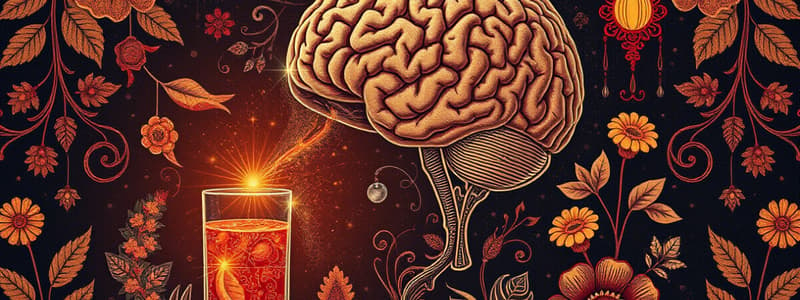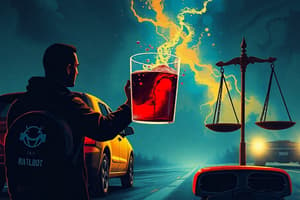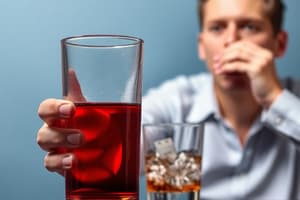Podcast
Questions and Answers
A standard drink contains ______ grams of alcohol.
A standard drink contains ______ grams of alcohol.
10
Larger body size means more body water to dilute alcohol, leading to a lower ______.
Larger body size means more body water to dilute alcohol, leading to a lower ______.
BAC
Eating food slows the absorption of alcohol into the ______.
Eating food slows the absorption of alcohol into the ______.
bloodstream
Alcohol is a ______; it slows down the central nervous system.
Alcohol is a ______; it slows down the central nervous system.
Underage drinking can lead to potential ______, such as fines or community service.
Underage drinking can lead to potential ______, such as fines or community service.
Alcohol absorption occurs mostly in the ______.
Alcohol absorption occurs mostly in the ______.
Drowsiness or fatigue reduces the ability to focus on the ______.
Drowsiness or fatigue reduces the ability to focus on the ______.
It takes about ______ hour to recover from consuming one standard drink.
It takes about ______ hour to recover from consuming one standard drink.
Study Notes
Alcohol Basics
- A standard drink contains 10 grams of alcohol.
- Alcohol absorption occurs mainly in the small intestine (80%) and partially in the stomach (20%).
Factors Influencing BAC (Blood Alcohol Concentration)
- Body Size and Composition: Larger individuals have more body water for alcohol dilution, resulting in a lower BAC.
- Food Intake: Consuming food before or after drinking slows alcohol absorption, aiding in lower BAC.
Alcohol's Effects on the Brain
- Cerebral Cortex: Alcohol can impair judgment, slow reaction times, and reduce inhibitions.
- Hippocampus: Involvement in memory formation leads to potential blackouts and difficulty creating new memories.
- Hypothalamus: Regulates heart rate, thirst, and body temperature; alcohol slows heart rate and increases urination.
- Medulla: Controls vital functions; alcohol can dangerously slow breathing and heartbeat.
- Central Nervous System: Alcohol slows communication between the brain and body, affecting reflexes and coordination.
- Cerebellum: Impairs balance and coordination, causing difficulty in walking and unsteady movements.
Alcohol as a Depressant
- Classified as a depressant, alcohol reduces alertness, coordination, and reaction time.
Risks of Underage Drinking
- Legal Risks: Underage drinking is illegal, resulting in potential fines, community service, or a criminal record.
- Health Risks: Can disrupt brain development, which continues until the mid-20s.
Short-Term Effects of Alcohol
- Drowsiness or Fatigue: Affects focus, impairing driving safety.
- Slowed Reaction Time: Reduces coordination and responsiveness to unexpected events, increasing the likelihood of accidents.
Recovery and Management
- Recovery from one standard drink requires approximately 1 hour.
- A useful strategy is to avoid mixing drinks to better manage intake and predict effects.
Alcohol Breakdown
- Primarily processed in the liver, which is crucial for minimizing alcohol's impact.
Studying That Suits You
Use AI to generate personalized quizzes and flashcards to suit your learning preferences.
Description
This quiz explores the various factors that influence Blood Alcohol Concentration (BAC) including body size, composition, and the role of food intake. It also covers the effects of alcohol on different parts of the brain such as the cerebral cortex and hippocampus. Test your knowledge on how these factors contribute to BAC levels and their implications.




